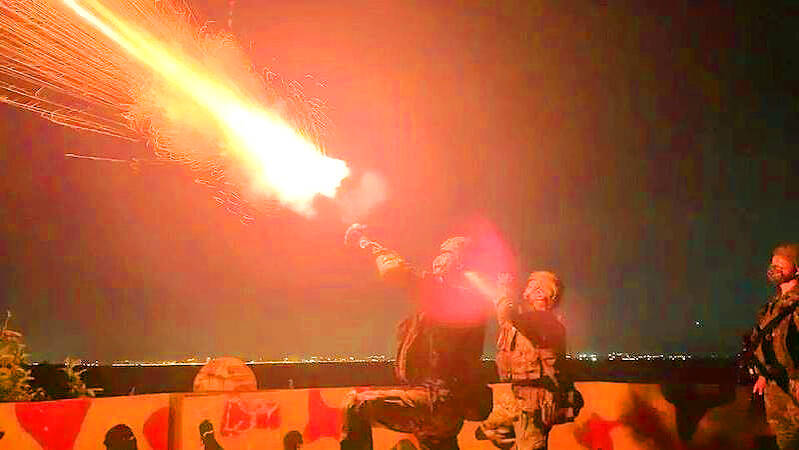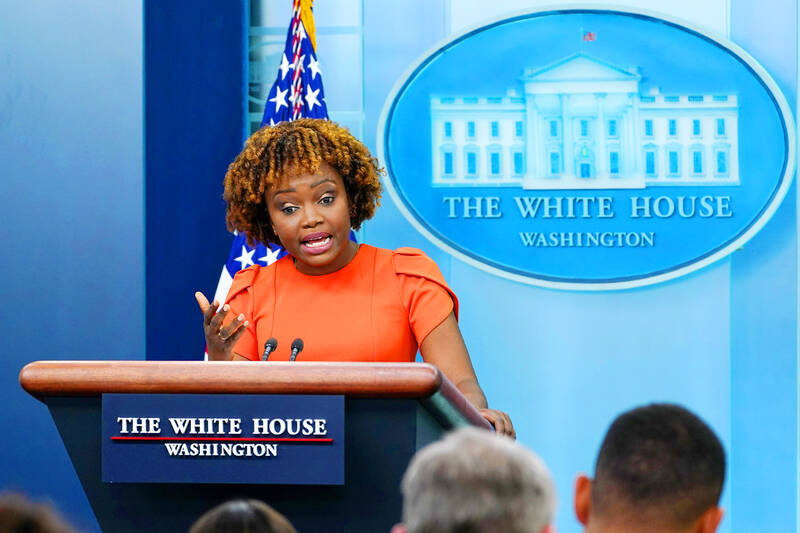The US would not accept Chinese maneuvers that attempt to establish a “new normal” across the Taiwan Strait, a White House official said on Monday about recent Chinese drone incursions on Taiwan’s outlying islands.
China has been trying to turn up the heat on Taiwan after US House of Representatives Speaker Nancy Pelosi visited Taipei early this month, US National Security Council spokesman John Kirby said.
He was answering a question during a conference call about how the US might react to a recent spate of drones from China that have been spotted over Taiwan’s outlying islands.

Photo courtesy of the Kinmen Defense Command
If it is true, it would appear to be in keeping with the Chinese People’s Liberation Army’s efforts — including Chinese warplanes flying over the median line of the Taiwan Strait — to establish a “new normal” regarding its activity in the Strait, Kirby said.
“We are simply not going to accept whatever new normal the Chinese want to put in place,” he said.
The Ministry of National Defense has called the repeated Chinese drone incursions near small islets in Kinmen County examples of China’s “cognitive warfare” campaign against Taiwan.

Photo: AP
Premier Su Tseng-chang (蘇貞昌) yesterday said that the Cabinet would fully support the ministry’s need to deal with the threat, a likely reference to its proposal to install a new anti-drone system by next year in Kinmen and Lienchiang counties.
Separately, White House press secretary Karine Jean-Pierre on Monday said that the US would continue to conduct standard air and maritime transits where international law allows in the Taiwan Strait to show its commitment to freedom of navigation and to protect the region.
“You will see in the coming days and weeks and months that our presence, posture and exercises account for China’s provocative and destabilizing behavior, with a view toward guiding the situation in the western Pacific toward greater stability,” Jean-Pierre told a news conference.
Two US Navy warships transited the Taiwan Strait on Sunday, the first such passage since China launched days of military drills around Taiwan after Pelosi’s visit.
A statement released by the 7th Fleet of the US Pacific Command said that the two ships were Ticonderoga-class guided-missile cruisers the USS Antietam (CG-54) and the USS Chancellorsville (CG-62).
Separately on Monday, Taiwan’s army released a four-step standard response to incursions by Chinese drones.
In a news release, the Kinmen Defense Command said that soldiers posted on Shi Islet (獅嶼) detected an uncrewed aerial vehicle flying at an altitude of 30m in a restricted area about 200m from the outpost at 4:08pm on Monday.
Based on standard response procedures for such incursions, soldiers fired warning flares before the drone flew away, heading to Xiamen in China about 5km away at 4:09pm, it said.
The command also made public for the first time what it described as its four-step response procedure for drone encounters, consisting of “firing warning flares, reporting the incursion, expelling the drone and ultimately shooting it down.”
It was not immediately clear if the response was drawn up recently or had been in place before the recent uptick in drone incursions.
However, it was the first time that the army divulged its response measures on a step-by-step basis, perhaps due to criticism of its lack of a serious response to more frequent drone incursions.
The ministry said it has been refraining from more aggressive countermeasures such as shooting drones down to avoid further escalating cross-strait tensions.

MAKING WAVES: China’s maritime militia could become a nontraditional threat in war, clogging up shipping lanes to prevent US or Japanese intervention, a report said About 1,900 Chinese ships flying flags of convenience and fishing vessels that participated in China’s military exercises around Taiwan last month and in January last year have been listed for monitoring, Coast Guard Administration (CGA) Deputy Director-General Hsieh Ching-chin (謝慶欽) said yesterday. Following amendments to the Commercial Port Act (商港法) and the Law of Ships (船舶法) last month, the CGA can designate possible berthing areas or deny ports of call for vessels suspected of loitering around areas where undersea cables can be accessed, Oceans Affairs Council Minister Kuan Bi-ling (管碧玲) said. The list of suspected ships, originally 300, had risen to about

DAREDEVIL: Honnold said it had always been a dream of his to climb Taipei 101, while a Netflix producer said the skyscraper was ‘a real icon of this country’ US climber Alex Honnold yesterday took on Taiwan’s tallest building, becoming the first person to scale Taipei 101 without a rope, harness or safety net. Hundreds of spectators gathered at the base of the 101-story skyscraper to watch Honnold, 40, embark on his daredevil feat, which was also broadcast live on Netflix. Dressed in a red T-shirt and yellow custom-made climbing shoes, Honnold swiftly moved up the southeast face of the glass and steel building. At one point, he stepped onto a platform midway up to wave down at fans and onlookers who were taking photos. People watching from inside

Japan’s strategic alliance with the US would collapse if Tokyo were to turn away from a conflict in Taiwan, Japanese Prime Minister Sanae Takaichi said yesterday, but distanced herself from previous comments that suggested a possible military response in such an event. Takaichi expressed her latest views on a nationally broadcast TV program late on Monday, where an opposition party leader criticized her for igniting tensions with China with the earlier remarks. Ties between Japan and China have sunk to the worst level in years after Takaichi said in November that a hypothetical Chinese attack on Taiwan could bring about a Japanese

The WHO ignored early COVID-19 warnings from Taiwan, US Deputy Secretary of Health and Human Services Jim O’Neill said on Friday, as part of justification for Washington withdrawing from the global health body. US Secretary of State Marco Rubio on Thursday said that the US was pulling out of the UN agency, as it failed to fulfill its responsibilities during the COVID-19 pandemic. The WHO “ignored early COVID warnings from Taiwan in 2019 by pretending Taiwan did not exist, O’Neill wrote on X on Friday, Taiwan time. “It ignored rigorous science and promoted lockdowns.” The US will “continue international coordination on infectious